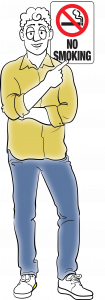 As a person puffs on a single cigarette, they are inhaling over 7,000 different chemicals into their lungs. Not only have many of those chemicals been identified as known carcinogens, but they also have been linked to numerous other harmful effects on the body.
As a person puffs on a single cigarette, they are inhaling over 7,000 different chemicals into their lungs. Not only have many of those chemicals been identified as known carcinogens, but they also have been linked to numerous other harmful effects on the body.
For instance, smoking increases the heart rate and tightens major arteries, meaning the heart has to work twice as hard to pump a person’s blood, inevitably putting more stress on the heart. Additionally, it increases your chance of stroke by raising your blood pressure, and can also increase your risk of a blood clot.
If you are or know someone that is currently a smoker, there is some good news, however… the affects of smoking on the heart subside within the first 24 hours after cessation, even starting to repair the damage done. Once you have successfully quit smoking altogether, other health risks will also decrease over time.
Still, nicotine – a chemical in cigarettes – is extremely addictive. Smokers not only become physically addicted to it, but they also link smoking to social activities which can make it even more difficult to quit. WellLiving recommends speaking with your family physician about your specific case before quitting cold turkey. Because there are so many methods to help quit, they will be able to help you navigate the best solution for you.
Cigarette Smoking: The Cold Hard Stats
Sometimes, seeing the numbers makes the decision to quit a little easier.
- Smoking is the single largest preventable cause of death and disease in the U.S., with 1 in 5 deaths attributed to the habit.
- Cigarette smoking kills more than 480,000 Americans each year.
- Quitting smoking for good often takes multiple attempts. But when coupling up quitting solutions, the success rate increases. Your family physician will be able to guide you to your best quitting solution.
- Smoking-related illnesses cost Americans more than $300 billion annually, $170 billion of which is directly related to medical care.
- On average, smokers die 10 years earlier than non-smokers.
